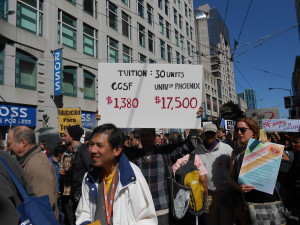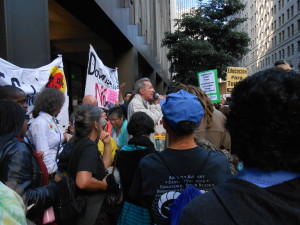Commentary: Community Mobilizes to Save City College of SF
Jul 11, 2013
Posted in Education/Schools/Youth, SF City College
By Helena Worthen and Joe Berry
If you have been trying to follow the fight over City College of San Francisco by reading the Chronicle, you are probably confused.
Could City College, which has been enrolling students since 1935, really disappear? What will happen to its 80,000-plus students? Wasn’t the November 2012 vote on the parcel tax a vote of confidence?
Where did the money go?
Why is the accrediting commission saying it will withdraw accreditation in a year? Who are they, anyway? Isn’t accreditation supposed to be a measure of quality? Is there any doubt about the quality of the education provided to students at City College?

The simple answer is that if the fight over City College proceeds in the direction the accrediting commission is mapping out, it will close, or at least be radically restructured and downsized.
Yet no one, including the commission, is criticizing the quality of the education students get. This is what makes the accrediting commission’s decision almost incredible.
In fact, City College, according to the Community College Board of Governors, exceeds state community college averages on 8 out of 13 standards. And yes, City College has enormous political support in the city and the state. Considering how many people consider City College their personal gateway to higher education, this is not surprising. So where is this coming from?
Withdrawing accreditation, which is what was recommended last week by the accrediting commission, is scheduled to take place in July 2014. The impact of this would be loss of access to public funding at all levels, from federal to state and local.
This would bring City College down immediately. It could also leave students stranded and devalue the degrees earned in the past by graduates.

There is background to this story, of course. The threat to City College can be understood as part of the overarching attack in public education generally.
Skyrocketing student debt, court decisions narrowing affirmative action, corporate-run charter schools and high-stakes testing are all turning public education into a desperation market where only the luckiest can buy or win access.
In higher education, the for-profit institutions, like University of Phoenix, are the equivalent of the corporate charter schools and are the most likely to benefit from the weakening of public community colleges.
The ladders of opportunity that helped reduce inequality in the decades after World War II are being pulled up. Now it’s “God bless the child who has his own.”
The accrediting commission, the ACCJC (Association of Community and Junior Colleges) is part of the WASC (Western Association of Schools and Colleges) and, while it is overseen by the Department of Education, is not actually part of it.
While it sounds at first like part of the government, it is, in fact, an independent entity and delivers programs that are funded by foundations.
In future columns, we will explore what students, faculty and supporters are doing to keep City College open. We’ll look at the struggle from the points of view of the Accreditation Commission, the City Board of Supervisors, and the Department of Education, as well as students, the majority of whom are members of minorities, and staff and faculty who work there.
A video of a protest Tuesday, July 9 in San Francisco to save City College is online at http://www.youtube.com/watch?v=gY1j3JnMYhE.
Helena Worthen is Professor Emerita of Labor and Employment Relations, University of Illinois, and long-time community college English teacher and union activist. Joe Berry is a retired City College teacher (History and Labor Studies), union leader and researcher on higher education and its workforce.